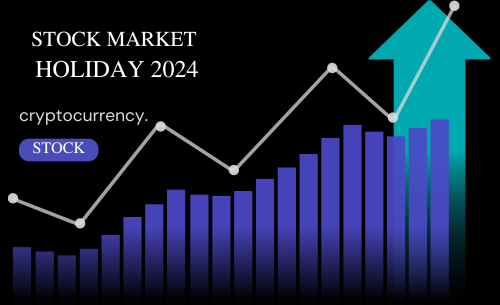The Stock Market Holidays in 2024 New Trends
Stock Market Holidays
Knowing the stock market holidays is essential for traders, investors, and financial professionals as we head into 2024. These holidays offer a chance to prepare ahead and strategy in addition to a break from the everyday bustle of the marketplaces. This article provides a thorough analysis of the stock market holidays in 2024 as well as some current financial trends.
Stock Market Holidays in 2024

New York Stock Exchange (NYSE) and NASDAQ
In 2024, the NYSE and NASDAQ, two of the biggest stock exchanges in the country, will be closed on the following holidays:
- January 1st is New Year’s Day. (Monday)
- January 15 is Martin Luther King Jr. Day.
- Presidents’ Day is on Monday, February 19.
- Good Friday is this Friday, March 29.
- Monday, May 27, is Memorial Day.
- July 4th is Independence Day, a Thursday.
- Labour Day is on Monday, September 2.
- Thanksgiving falls on a Thursday, November 28.
- Christmas Day is Wednesday, December 25.
London Stock Exchange (LSE)
Here are the holidays for those who trade on the LSE:
- January 1st is New Year’s Day. (Monday)
- Good Friday is this Friday, March 29.
- Monday, April 1st is Easter Monday.
- Early May Monday, May 6, is a bank holiday.
- Spring Bank Holiday: Monday, May 27.
- August 26, Monday, is the summer bank holiday.
- Christmas Day is Wednesday, December 25.
- Boxing Day is on Thursday, December 26.
Stock Exchange of Tokyo (TSE)
Important TSE holidays are as follows:
- January 1st is New Year’s Day. (Monday)
- Day of Coming of Age: Monday, January 8,
- National Foundation Day occurs on Sunday, February 11.
- Wednesday, March 20, is the Vernal Equinox.
- Holidays for Golden Week: April 29–May 6
- Monday, July 15, is Marine Day.
- August 12 is Mountain Day, commemorated on a Monday.
- September 16, Monday, is Respect for the Elderly Day.
- Autumnal Equinox: Monday, September 23
- Health and Sports Day is on Monday, October 14.
- November 23 is Labour Day, a Saturday.
- Monday, December 23, is the Emperor’s birthday.
NSE of India and Bombay the Stock Exchange
The following holidays are observed in India in 2024 by the BSE and NSE:
- Republic Day is on Friday, January 26.
- Maha Shivaratri is on Friday, March 8.
- Holi is on Monday, March 25.
- Good Friday is this Friday, March 29.
- April 14 is Dr. Baba Saheb Ambedkar Jayanti (Sunday).
- Maharashtra Day: Wednesday, May 1.
- Bakri Id: Monday, June 17,
- August 15 is Independence Day, a Thursday.
- Ganesh Chaturthi falls on Monday, September 9.
- October 2 is Mahatma Gandhi Jayanti, a Wednesday.
- October 11 (Friday) is Dussehra.
- November 1st is
- Diwali Laxmi Pujan (Friday; the market closes early).
- Diwali Balipratipada is on Monday, November 4.
- Gurunanak Jayanti is on Friday, November 15.
- Christmas is on Wednesday, December 25.
Stock Market Trending Points for 2024:
1. Integration of AI and Machine Learning
The financial markets are still changing thanks to machine learning and artificial intelligence (AI). These technologies, which range from algorithmic trading to predictive analytics, improve trading methods and offer a more in-depth understanding of market trends.
2. Ecological Funding
The concept of Environmental, Social, and Governance (ESG) investing has been increasingly popular in the last few years. Sustainability is becoming more and more important to investors, and businesses that implement sound ESG policies are doing better on the market.
3. The use of blockchain technology in cryptocurrency
Blockchain technology and cryptocurrencies are still popular subjects in the financial industry. In 2024, there may be greater integration of blockchain apps and digital currencies into traditional finance due to their growing adoption.
4. The Recovering World Economy
Global markets are seeing notable changes as the world struggles to recover from the COVID-19 pandemic’s economic effects. By 2024, the key issue will be how various economies handle growth, interest rates, and inflation.






